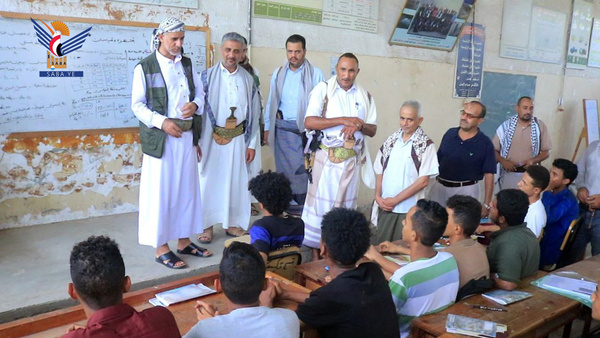
Hodeida - Saba:
First Deputy Prime Minister Scholar Mohammed Miftah; Deputy Prime Minister and Minister of Local Administration and Rural Development Mohammed al-Madani; Minister of Education, Higher Education and Scientific Research Hasan al-Sa’adi; and Hodeida governor Abdullah Atifi on Monday inspected the progress of educational and training activities at technical institutes in the city of Hodeida.
Accompanied by Undersecretary of the Ministry of Local Administration Ammar al-Harib, the officials toured vocational workshops and training facilities, where they observed hands-on training programs in carpentry, furniture making, and chair manufacturing.
They received a briefing from Technical Sector Head Hassan Hadish on how the programs are implemented and student engagement levels.
The officials also visited several classrooms and reviewed the theoretical curricula offered to students and how they are integrated with practical applications, commending the level of organization and discipline observed.
The delegation, including deputy heads of the technical sector and several directors of technical and vocational institutes, also visited the central furniture and chair workshop, where they were briefed on production progress and practical training processes.
Scholar Miftah expressed appreciation for the high-quality technical and training performance at the institute, praising the efforts of the educational staff in equipping youth with vital skills that contribute to sustainable development.
He stressed that the government places great importance on vocational and technical education as a cornerstone of economic development, noting that the graduates of these institutes represent a crucial supply to the labor market, particularly in the current challenging circumstances.
Miftah described the institute as a successful model that could be replicated in other provinces, calling for enhanced equipment and upgraded training programs to align with national development needs.
For his part, al-Madani emphasized the importance of vocational institutes in creating job opportunities for youth, stressing the need for continued governmental support for these vital sectors that directly address community needs.
Meanwhile, the Minister of Education affirmed the government’s commitment to developing vocational institutes and expanding their programs to meet local market demands and improve youth employability.
He noted that the visit forms part of a field assessment to evaluate performance, identify challenges and needs, and work towards enhancing the effectiveness of these institutions while ensuring integration with general education.
Governor Atifi praised the government’s attention to and support for vocational institutes, and its efforts in providing equipment and training necessary to elevate performance and achieve developmental goals.
Technical sector officials also appreciated the visit by government leaders, seeing it as a sign of genuine support for technical education and its critical role in skill development and youth empowerment.
First Deputy Prime Minister Scholar Mohammed Miftah; Deputy Prime Minister and Minister of Local Administration and Rural Development Mohammed al-Madani; Minister of Education, Higher Education and Scientific Research Hasan al-Sa’adi; and Hodeida governor Abdullah Atifi on Monday inspected the progress of educational and training activities at technical institutes in the city of Hodeida.
Accompanied by Undersecretary of the Ministry of Local Administration Ammar al-Harib, the officials toured vocational workshops and training facilities, where they observed hands-on training programs in carpentry, furniture making, and chair manufacturing.
They received a briefing from Technical Sector Head Hassan Hadish on how the programs are implemented and student engagement levels.
The officials also visited several classrooms and reviewed the theoretical curricula offered to students and how they are integrated with practical applications, commending the level of organization and discipline observed.
The delegation, including deputy heads of the technical sector and several directors of technical and vocational institutes, also visited the central furniture and chair workshop, where they were briefed on production progress and practical training processes.
Scholar Miftah expressed appreciation for the high-quality technical and training performance at the institute, praising the efforts of the educational staff in equipping youth with vital skills that contribute to sustainable development.
He stressed that the government places great importance on vocational and technical education as a cornerstone of economic development, noting that the graduates of these institutes represent a crucial supply to the labor market, particularly in the current challenging circumstances.
Miftah described the institute as a successful model that could be replicated in other provinces, calling for enhanced equipment and upgraded training programs to align with national development needs.
For his part, al-Madani emphasized the importance of vocational institutes in creating job opportunities for youth, stressing the need for continued governmental support for these vital sectors that directly address community needs.
Meanwhile, the Minister of Education affirmed the government’s commitment to developing vocational institutes and expanding their programs to meet local market demands and improve youth employability.
He noted that the visit forms part of a field assessment to evaluate performance, identify challenges and needs, and work towards enhancing the effectiveness of these institutions while ensuring integration with general education.
Governor Atifi praised the government’s attention to and support for vocational institutes, and its efforts in providing equipment and training necessary to elevate performance and achieve developmental goals.
Technical sector officials also appreciated the visit by government leaders, seeing it as a sign of genuine support for technical education and its critical role in skill development and youth empowerment.